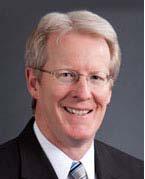|
UBS Managing Director John Savercool Ponders Market Volatility and the US Debt Crisis By Mark Melin 
John Savercool
In regards to the debt crisis, investors can expect different market outcomes and potential volatility levels depending on who is elected, according to Mr. Savercool, senior lobbyist and managing director at UBS Americas. "If you like stability, less choppiness in the market, the Obama approach will result in quicker agreement," he said. "The Romney approach would take longer but if you like lower tax structures that would be the ultimate outcome." "If Obama is re-elected, keeping the status quo, a narrow democratic majority in the Senate and Republican control in the house, then watch for some Republican capitulation on revenue increases," Mr. Savercool said. "If Republicans thought the ratio of spending cuts to revenue increases was large enough, they might give something up in terms of revenue increases." "If Obama is re-elected’⬦ then watch for some Republican capitulation on revenue increases. If Romney wins they likely won't negotiate during the lame duck session." "If Romney wins, then he is likely to bring with him a few Republican Senators and will likely have a majority in the Senate and House. If Romney wins they likely won't negotiate during the lame duck session, but rather wait it out until late January when Romney takes over. The danger here is there will be an overlap between when the fiscal cliff occurs January 1 and the inauguration of the new president later in the month." According to Mr. Savercool, most lawmakers are aware of the range of negative scenarios that could play out if the debt crisis is not addressed. "I don't know of any politician from any party who wants the consequences to play themselves out, but I do know they feel strongly about their principles and positions, and they will want concessions. That's got to happen regardless of who is president." With the US debt crisis coming to a head, Mr. Savercool anticipates the market to react in a volatile way, particularly in December during the "lame duck session" as partisan political groups argue over who sacrifices. "You have this dynamic where the two polar opposites are in control in Congress, liberal + conservative. Those in the middle are not strong enough to make a difference and bridge those two sides so that compromise can be possible on a wide range of issues, especially the big issue (balancing the budget) we all know must be dealt with." "It is hard to imagine Congress making headway on one of the toughest issues over a 50 day period of time (November 7 ’β¬β December 31) right in the middle of two major holidays," he said. "This is when the market may come back and focus on the dysfunction of Washington DC again." Defense spending is one of the larger issues. Congress must reduce defense spending by $500 billion over ten years. "We are in two wars, and in a confrontation right now I don't know how to describe. The defense industry is a strong industry in Washington DC and they have a presence in most of the key swing states that will in effect determine the election: Virginia, Florida, Pennsylvania, Ohio. Most Democrats and Republicans agree cuts need to be made, budget needs to get close to balanced, but issue is how, and that is where the partisan divide enters the equation." "Everyone should be skeptical about Washington's desire to trim the deficit and shrink government" "Everyone should be skeptical about Washington's desire to trim the deficit and shrink government," Mr. Savercool commented. "In my experience I've never seen members of Congress who are really committed to incurring the pain that must be incurred to reduce the deficit. Republicans and Democrats talk a lot about the need to reduce the deficit, but when it comes down to it they lose a little courage to reduce something that has already been created, whether it is a tax break or federal spending program. It's like going on a diet. Planning to do it is great, but when you actually have to skip lunch one day its harder." For politicians, Greece is their reference point, according to Mr. Savercool. "Most lawmakers can't explain to you what the problem is with Greece, but they know it isn't working. We don't want to become the next Greece is a popular sentiment." However the road to a sustainable US budget will not be traveled lightly. "The only way to get deficit reduced is to have a strong president and sells deficit reduction to the public and the president is popular enough to pull Congress along." Mr. Savercool noted that in order for voters to accept sacrifice, "Someone needs to explain the debt implications of the debt crisis in a credible way. They need to chart a path that involves collective sacrifice and sell it. If people see themselves giving something up and getting something nationally significant in return, they might accept it. If they don't believe the sacrifice is going to the national good they won't support it." About John Savercool: John is a 23-year veteran of Capitol Hill. He began his career with U.S. Congressman Mike Oxley, a Republican from Ohio and former chairman of the House Financial Services Committee. John then embarked on a 17-year career with then-U.S. Congressman Phil Gramm (Texas), who won election to the U.S. Senate in 1984. John joined Senator Gramm and worked with him until 1999. John worked in a variety of capacities, including legislative assistant and deputy chief of staff, over his 15-year Senate history with Senator Gramm. John also served as interim chief of staff for U.S. Senator Kay Bailey Hutchison in 1993. In 2003, he was selected by UBS to become the firm's first full-time, senior lobbyist to direct the firm's advocacy activities in Washington. John also directs the firm's political action committee and manages the firm's political relationships in Washington. In 2006, he was appointed to the select UBS Investment Bank Operating Committee, which provides overall senior-level guidance to the bank in all facets of its operation. John is a graduate of Frostburg State University (Maryland) and has played leadership roles in a number of federal, state and local political campaigns in Maryland and Texas. |
|
This article was published in Opalesque Futures Intelligence.
|





 RSS
RSS










